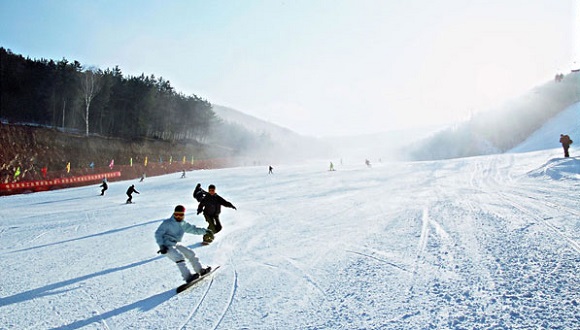The Beijing 2022 delegation has underlined the bid's full alignment with the principles of the Olympic Agenda 2020 and stressed sustainability as one of the key pillars of the Games plans.
Since the very inception of the bid, Beijing 2022 made its priority to design a Games that would be athlete-centered, sustainable and economical and would both support the delivery of Olympic Agenda 2020 and broader regional development plans in China.
In this way, Beijing 2022 will take full advantage of both the tremendous Beijing 2008 Olympic and Paralympic Games legacy - including existing competition venues, infrastructure and people with deep operational experience - and having a clear vision of how the 2022 Olympic and Paralympic Winter Games is integrated in China's existing regional economic development plans.
A key element of the country's existing plans is the development of a winter sports industry and meeting a growing demand for recreational activity and sport.
Beijing 2022 will re-use 11 of 12 competition and non-competition facilities including four iconic venues- National Stadium (also known as Bird's Nest), National Aquatics Center (also known as Water Cube), Wukesong MasterCard Center and the China National Convention Center (CNCC).
These four venues are excellent examples of the concept of sustainability. Over the past seven years, they have grown into the "go-to" multi-purpose arenas for Beijing's biggest events, fulfilling the principles outlined in the IOC's Agenda 2020 and setting a new standard of sustainability for the future of the Olympic Movement. The venues also have responded Beijing and China's growing interest in winter sports by hosting an increasing number of winter-sports related events.
The 2008 Olympics also left a pool of high-level professionals. 10 million employees in areas as broad as venue design and construction, sports, marketing, hospitality, medical services, media operations, transport and many more, as well as 100,000 volunteers, offer the unique experience that exists: delivering the biggest world sports event ever.
Mayor of Beijing and President of the Beijing 2022 Bid Committee Wang Anshun said: "The opportunity to utilize the experience of the great many professionals with Olympic delivery experience for a common project will secure the smooth delivery of successful Games. Our human legacy is our biggest asset."
After preparations to 2008 Games, Beijing has high-level and robust health-care resources and services. 22 first-class hospitals in Beijing and Zhangjiakou will be designated as the 2022 hospitals, with more than 30,000 beds. These hospitals have long experience in treating patients and injuries, particularly relating to winter sports.
In terms of accommodation, Beijing is one of the world's top destinations for tourism and business with existing 518 star-rated hotels providing 110,000 rooms, most of which were tried and tested during the 2008 Games and fully satisfy IOC requirements with the existing room supply.
The National Strategy of Coordinated and Integrated Development of the Beijing-Tianjin-Hebei region will create favorable conditions and lay a solid base for the bid for Beijing 2022, creating a "win-win" environment for future investment.
Among other benefits Beijing 2022 will directly benefit from a large number of development aspects:
The Beijing 2022 Games will both contribute to and benefit from accelerated development of the Beijing-Zhangjiakou Sport, Culture and Tourism Belt and the creation of a major winter sports center, attracting millions of tourists from China, all over Asia and from around the world,
The Games will help deliver a new model of sustainable development for the region and beyond, which will positively impact many generations to come,
The high-speed rail between Beijing and Zhangjiakou will bring the latter's local businesses and 4.5 million residents much closer with the international metropolis of Beijing.
The Games will contribute to creating approximately hundreds of thousands new jobs across sports, culture, tourism and leisure industries.
Mayor Wang concluded: "We coordinated our vision of Beijing 2022 and the three Games Zones around the integrated development of the Beijing-Tianjin-Hebei region, a plan that was in the works long before the idea of hosting the Winter Games was conceived. This context, along with the solid infrastructural and human legacy of the Beijing 2008 Games, ensure that Beijing 2022 Games would be truly economical and sustainable."
